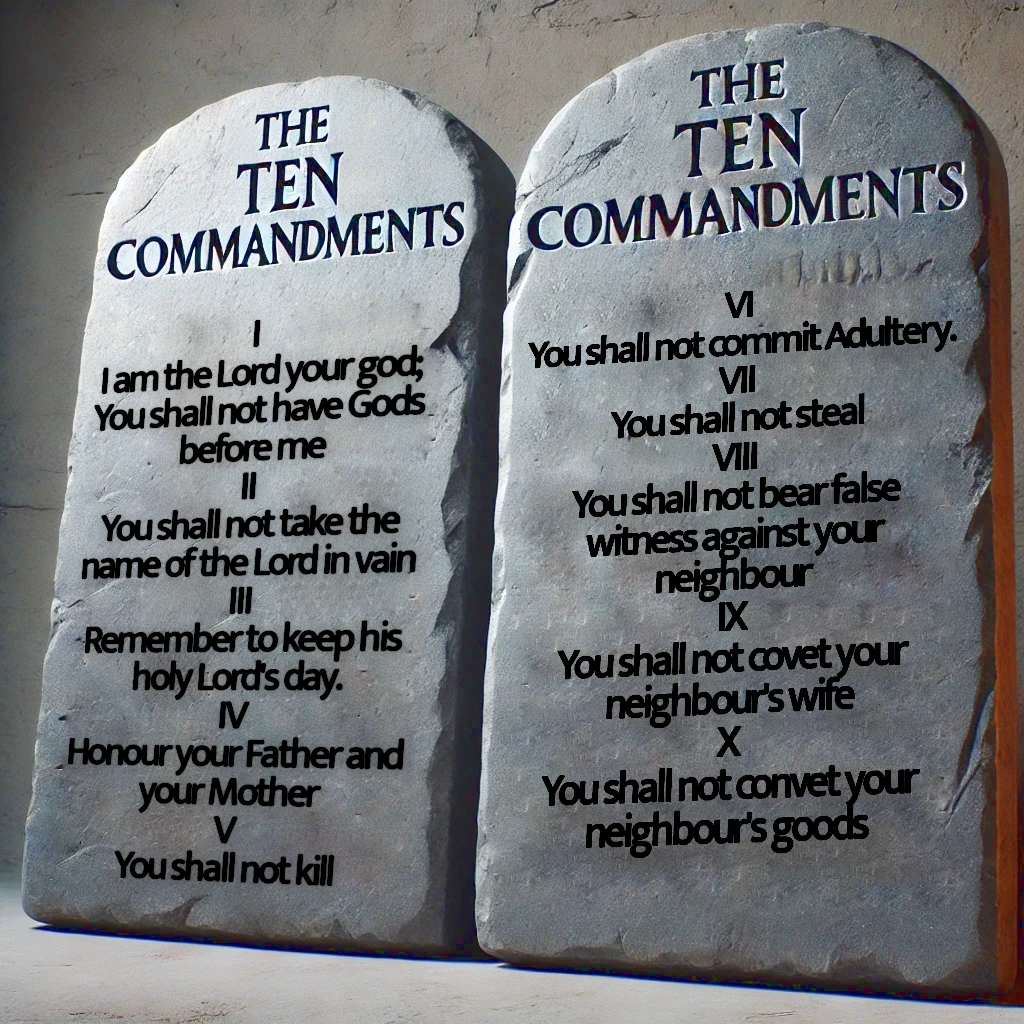The 10 Commandments are God’s eternal laws, providing guidance for living a holy and fulfilling life.
If you are looking for a simple guide to the 10 Commandments, please read our post: The 10 Commandments: A Simple Guide to God’s Laws
Introduction: What Are the 10 Commandments?
The 10 Commandments are a cornerstone of Judeo-Christian (Christian and Judaism (Jewish)) faith, serving as a timeless guide for how we relate to God and one another.
Given to Moses on Mount Sinai and recorded in the Bible (Exodus 20:1-17; Deuteronomy 5:6-21), these ten laws form the foundation of moral and spiritual living.
They are not just rules; they reflect God’s character and His desire for humanity to live in harmony with Him and others.
Often called the Decalogue (meaning “ten words”), the 10 Commandments are divided into two main categories: the first four commandments focus on our relationship with God, and the remaining six emphasize how we treat others. Together, they encapsulate the essence of Jesus’ teaching in Matthew 22:37-40, where He said:
- “Love the Lord your God with all your heart and with all your soul and with all your mind. This is the first and greatest commandment. And the second is like it: Love your neighbour as yourself.”
The commandments are as relevant today as they were thousands of years ago. They provide a moral compass in a world often filled with confusion and chaos, helping us to prioritize our faith and live lives of integrity, compassion, and holiness.
In this post, we’ll take an in-depth look at each commandment, exploring its meaning, biblical context, and practical application for modern life.
Whether you’re new to studying the Bible or looking to deepen your understanding, this guide will illuminate the eternal wisdom of the 10 Commandments and how they continue to shape our lives today.
The Historical Context of the 10 Commandments
The story of the 10 Commandments begins in the Old Testament, during a pivotal moment in Israel’s history.
After God delivered the Israelites from slavery in Egypt through Moses, He led them into the wilderness and created a covenant with them at Mount Sinai.
It was here, amidst thunder, lightning, and a trembling mountain, that God gave His people the 10 Commandments as recorded in Exodus 19-20.
The commandments were written on two stone tablets by the very hand of God (Exodus 31:18) and were presented to Moses to share with the Israelites.

These laws were part of a larger covenant, where God declared that the Israelites would be His chosen people if they obeyed His commandments:
- “Now if you obey me fully and keep my covenant, then out of all nations you will be my treasured possession.” (Exodus 19:5-6)
The timing of the 10 Commandments was significant. The Israelites had just been freed from years of slavery and were beginning a new chapter as a nation under God’s guidance.
The commandments provided them with a moral and spiritual framework, helping them understand how to worship God and live in harmony with one another.
Beyond their immediate purpose, the commandments symbolized a deeper relationship between God and humanity.
They were not just rules to follow but a reflection of God’s holiness and His desire for His people to reflect His character.
These commandments have since become the bedrock of Judeo-Christian ethics, influencing not only religious practices but also legal systems and societal values around the world.
They serve as a reminder of God’s covenant and the responsibility of His people to live lives that honour Him.
In the next section, we’ll explore each commandment in detail, uncovering their meaning and application for our lives today.
The 10 Commandments: Explained One by One
The 10 Commandments are more than a list of rules; they are a guide for living a life that honours God and reflects His love to others.
Let’s take a closer look at each commandment, exploring its meaning, biblical context, and how we can apply it in our daily lives.

1. You Shall Have No Other Gods Before Me
- Text: “You shall have no other gods before me.” (Exodus 20:3)
- Meaning: This commandment calls for exclusive devotion to God, rejecting idolatry and anything that takes priority over Him in our lives.
- Biblical Insight: Matthew 6:24 reminds us, “No one can serve two masters.” Anything—money, career, relationships—that takes God’s place becomes a false god.
- Application: Evaluate your life. Are there things you choose over your relationship with God? Seek to put Him first in all areas.
2. You Shall Not Make for Yourself an Idol
- Text: “You shall not make for yourself an image in the form of anything in heaven above or on the earth beneath or in the waters below.” (Exodus 20:4)
- Meaning: This commandment forbids the worship of physical objects or representations of God, emphasizing that He is spirit and beyond human comprehension.
- Biblical Insight: John 4:24 says, “God is spirit, and His worshipers must worship in the Spirit and in truth.”
- Application: Avoid elevating material possessions, traditions, or symbols to the value of worship. Focus on a personal relationship with God.
3. You Shall Not Misuse the Name of the Lord Your God
- Text: “You shall not misuse the name of the Lord your God, for the Lord will not hold anyone guiltless who misuses His name.” (Exodus 20:7)
- Meaning: God’s name is holy and should be used with reverence, not in vain, casually, or dishonestly.
- Biblical Insight: Matthew 6:9 teaches us to pray, “Hallowed be your name,” showing reverence in addressing God.
- Application: Be mindful of how you talk about God. Use His name in prayer, worship, and truth, not in anger or disrespect.
4. Remember the Sabbath Day by Keeping It Holy
- Text: “Remember the Sabbath day by keeping it holy.” (Exodus 20:8)
- Meaning: The Sabbath is a day of rest and worship, reminding us to honour God and trust in His provision.
- Biblical Insight: Jesus said, “The Sabbath was made for man, not man for the Sabbath” (Mark 2:27), emphasizing its purpose for rest and renewal.
- Application: Dedicate one day each week to rest, worship e.g. Sunday, and spending time with God and loved ones.
5. Honour Your Father and Your Mother
- Text: “Honour your father and your mother, so that you may live long in the land the Lord your God is giving you.” (Exodus 20:12)
- Meaning: This commandment emphasizes respecting and valuing parents and authority figures.
- Biblical Insight: Ephesians 6:1-3 reaffirms this commandment: “Honour your father and mother” and promises a blessing for those who obey it.
- Application: Show respect and care for your parents or guardians. Seek reconciliation where relationships are strained.
6. You Shall Not Murder
- Text: “You shall not murder.” (Exodus 20:13)
- Meaning: This commandment protects the sanctity of human life, forbidding intentional harm or killing.
- Biblical Insight: Jesus expanded this in Matthew 5:21-22, warning against anger and hatred, which can lead to sin.
- Application: Value all human life. Strive to resolve conflicts peacefully and protect your heart against hatred.
7. You Shall Not Commit Adultery
- Text: “You shall not commit adultery.” (Exodus 20:14)
- Meaning: This commandment upholds the sanctity of marriage and calls for faithfulness in relationships.
- Biblical Insight: Jesus raised the standard in Matthew 5:28: “Anyone who looks at a woman lustfully has already committed adultery with her in his heart.”
- Application: Honour your commitments. Guard against temptation and invest in creating healthy, faithful relationships.
8. You Shall Not Steal
- Text: “You shall not steal.” (Exodus 20:15)
- Meaning: This commandment forbids taking what does not belong to you, promoting honesty and integrity.
- Biblical Insight: Ephesians 4:28 teaches, “Anyone who has been stealing must steal no longer, but must work, doing something useful with their own hands.”
- Application: Be honest in all your dealings. Respect others’ belongings and contribute positively to society.
9. You Shall Not Give False Testimony
- Text: “You shall not give false testimony against your neighbor.” (Exodus 20:16)
- Meaning: This commandment forbids lying, especially in ways that harm others or spread falsehoods.
- Biblical Insight: Proverbs 12:22 says, “The Lord detests lying lips, but He delights in people who are trustworthy.”
- Application: Speak truthfully in all situations. Avoid gossip and slander, and try to build trust.
10. You Shall Not Covet
- Text: “You shall not covet your neighbour’s house, wife, servants, ox, donkey, or anything that belongs to your neighbour.” (Exodus 20:17)
- Meaning: This commandment warns against jealousy and discontentment, calling us to trust in God’s provision.
- Biblical Insight: Hebrews 13:5 advises, “Keep your lives free from the love of money and be content with what you have.”
- Application: Practice gratitude. Focus on what you have rather than what others have.
The Purpose of the 10 Commandments
The 10 Commandments serve as far more than just a list of rules, they represent God’s desires for how we live in relationship with Him and with one another.
Their purpose is deeply spiritual, moral, and practical, offering timeless guidance for the human race.
1. To Reflect God’s Holiness
The commandments reveal God’s character and His holiness. By following them, we reflect His nature and demonstrate our commitment to living in alignment with His will. Leviticus 11:45 says, “Be holy, because I am holy.” The 10 Commandments set the standard for holy living, helping us to model our lives after God’s righteousness.
2. To Guide Our Relationship with God
The first four commandments focus on our relationship with God. They teach us how to honor Him, worship Him exclusively, and keep His name and day holy. This reflects the greatest commandment, as stated by Jesus in Matthew 22:37: “Love the Lord your God with all your heart, with all your soul, and with all your mind.”
3. To Foster Loving Relationships with Others
The remaining six commandments emphasize how we treat others. They call for respect, honesty, and faithfulness, creating the foundation for harmonious relationships. Jesus summarized this in Matthew 22:39: “Love your neighbor as yourself.” By living out these principles, we build communities rooted in kindness, justice, and compassion.
4. To Reveal Our Need for a Saviour
The 10 Commandments show us God’s perfect standard, but they also reveal our inability to fully meet it on our own. Romans 3:20 states, “Through the law we become conscious of our sin.” This awareness points us to Jesus, who fulfilled the law on our behalf and offers us grace through His sacrifice.
5. To Provide a Moral Compass

The commandments offer a universal code of ethics, guiding our decisions and actions.
In a world filled with conflicting values, they serve as a moral compass, helping us distinguish right from wrong. Psalm 119:105 reminds us, “Your word is a lamp to my feet and a light to my path.”
6. To Strengthen Our Covenant with God
The commandments are part of God’s covenant with His people. By obeying them, we demonstrate our loyalty to God and our desire to live according to His will. Deuteronomy 7:9 says, “Know therefore that the Lord your God is God; He is the faithful God, keeping His covenant of love to a thousand generations of those who love Him and keep His commandments.”
7. To Promote Justice and Peace
The commandments provide a framework for societal justice and peace. Principles like honesty, respect, and fairness create a foundation for healthy communities. By adhering to them, we contribute to a more just and harmonious world.
Living Out the Purpose of the Commandments
The 10 Commandments were not given to burden us but to guide us toward a life of holiness, love, and peace. They remind us of our dependence on God and His grace, inviting us into a deeper relationship with Him and with others.
As Romans 13:10 beautifully summarizes: “Love does no harm to a neighbour. Therefore love is the fulfilment of the law.”
The Relationship Between the Old Testament Law and Jesus
The 10 Commandments are part of the Old Testament law, given to guide God’s people in holiness and obedience. When Jesus came, He didn’t abolish these laws but fulfilled them, bringing a deeper understanding of their purpose and application in our lives.
1. Jesus Fulfilled the Law

In Matthew 5:17, Jesus said, “Do not think that I have come to abolish the Law or the Prophets; I have not come to abolish them but to fulfil them.” Jesus perfectly obeyed the law, living a sinless life and completing the requirements of the Old Testament covenant. His fulfilment of the law makes salvation available to us, not through our works, but through faith in Him.
2. From Rules to Relationship
The 10 Commandments focus on external obedience, but Jesus emphasized the heart behind the law. In the Sermon on the Mount (Matthew 5-7), Jesus raised the standard by addressing the internal attitudes that lead to sin. For example:
- “You have heard that it was said, ‘You shall not murder.’ But I tell you that anyone who is angry with a brother or sister will be subject to judgment.” (Matthew 5:21-22)
- “You have heard that it was said, ‘You shall not commit adultery.’ But I tell you that anyone who looks at a woman lustfully has already committed adultery with her in his heart.” (Matthew 5:27-28)
Jesus shifted the focus from mere compliance to a heart that loves God and others.
3. The Greatest Commandments
When asked which commandment was the greatest, Jesus summarized the entire law in two principles:
- “Love the Lord your God with all your heart and with all your soul and with all your mind.”
- “Love your neighbor as yourself.” (Matthew 22:37-39)
These two commandments encapsulate the 10 Commandments. The first four focus on loving God, while the last six focus on loving others. Jesus simplified the law into love—a love that reflects God’s nature.
4. The Role of Grace
Through Jesus, we are no longer bound by the Old Testament law as a means of salvation. Instead, we are saved by grace through faith. Ephesians 2:8-9 declares, “For it is by grace you have been saved, through faith—and this is not from yourselves, it is the gift of God—not by works, so that no one can boast.”
While the law reveals our sin, Jesus provides the grace to overcome it and the strength to live in alignment with God’s will.
5. Living Out the Spirit of the Law
Although Jesus fulfilled the law, the principles of the 10 Commandments remain relevant. They guide us in living lives that honor God and reflect His love. Through the Holy Spirit, believers are empowered to live out the spirit of the law—not as a burden but as a joyful expression of faith.
Conclusion
The relationship between the Old Testament law and Jesus is one of fulfilment, grace, and transformation. Jesus didn’t discard the 10 Commandments; He deepened their meaning, shifting the focus to love and the heart behind our actions. By following Jesus, we fulfil the spirit of the law and grow closer to God.
Why the 10 Commandments Are Still Relevant Today
In a rapidly changing world, some may question whether the 10 Commandments, laws given thousands of years ago still hold significance. Yet, their principles remain as vital and applicable today as when God first gave them. Here’s why the 10 Commandments continue to guide and shape our lives.

1. They Reflect God’s Eternal Character
The 10 Commandments reveal who God is—holy, just, and loving. His nature doesn’t change, and neither do His expectations for how we should live. Malachi 3:6 says, “I the Lord do not change.” These commandments remind us of God’s consistency and our call to reflect His character.
2. They Provide a Moral Compass
The commandments set a clear standard for right and wrong, offering timeless guidance in a world of shifting values. Whether it’s the call to honor parents, avoid dishonesty, or respect life, the 10 Commandments provide a foundation for ethical living. Psalm 119:9 asks, “How can a young person stay on the path of purity? By living according to Your word.”
3. They Strengthen Our Relationship with God
The first four commandments focus on worship, reverence, and devotion to God. These principles remind us to put Him first in every area of life, cultivating a deeper, more intimate relationship with Him. As Matthew 6:33 encourages, “Seek first His kingdom and His righteousness, and all these things will be given to you as well.”
4. They Foster Healthy Relationships
The last six commandments guide us in how we treat others, emphasizing respect, honesty, and integrity. These principles are the foundation of strong families, friendships, and communities. By following them, we can create a more peaceful and just society. Romans 13:10 says, “Love does no harm to a neighbor. Therefore love is the fulfillment of the law.”
5. They Help Us Recognize Our Need for Grace
The commandments set a high standard that none of us can fully meet. They highlight our need for a Saviour and point us to Jesus, who fulfilled the law on our behalf. Romans 3:20 reminds us, “Through the law we become conscious of our sin.” By recognizing our shortcomings, we are drawn to God’s grace and forgiveness.
6. They Are Universally Relevant
The principles behind the 10 Commandments transcend time, culture, and geography. Whether we’re discussing honesty in business, respect in relationships, or faithfulness to commitments, their guidance remains applicable in every era and context.
7. They Lead Us to True Freedom
While some view the commandments as restrictive, they are actually designed to protect and bless us. By living according to God’s laws, we experience freedom from sin and its destructive consequences. Psalm 119:45 declares, “I will walk about in freedom, for I have sought out Your precepts.”
Living the 10 Commandments Today
The 10 Commandments are not outdated relics of the past—they are a living testament to God’s wisdom and love. By understanding and applying their principles, we honor God, build stronger relationships, and live with integrity and purpose.
Let the 10 Commandments be a guide for your life, offering timeless wisdom in an ever-changing world.
Common Questions About the 10 Commandments
The 10 Commandments are deeply significant, but they often raise questions about their purpose, interpretation, and relevance.
Here are answers to some of the most common questions about the commandments, grounded in biblical wisdom.
1. Are the 10 Commandments Still Binding for Christians?
Yes, the principles of the 10 Commandments remain relevant for Christians, though they are fulfilled in Christ. Jesus affirmed their importance, summarizing them in Matthew 22:37-40: “Love the Lord your God with all your heart, with all your soul, and with all your mind… Love your neighbor as yourself.” While Christians are saved by grace and not by works, the commandments provide a moral framework for living in alignment with God’s will.
2. What’s the Difference Between the Old Testament Law and the New Testament Teachings?
The Old Testament law, including the 10 Commandments, was given to guide Israel in their covenant with God. In the New Testament, Jesus fulfilled the law (Matthew 5:17-18), shifting the focus from external obedience to the internal transformation of the heart. Christians are called to live by the spirit of the law, characterized by love and grace, rather than relying on the law for salvation.
3. Why Are There Differences in Numbering the Commandments?
Different traditions group the commandments slightly differently. For example:
- Catholic and Lutheran traditions combine the prohibition of false gods and idols into one commandment, while dividing the commandment against coveting into two.
- Jewish and most Protestant traditions separate the prohibition of false gods and idols but treat the commandment against coveting as one.
Despite these differences, the essence of the commandments remains unchanged.
4. Are the 10 Commandments the Only Laws in the Bible?
No, the Bible contains many additional laws, particularly in the Torah (first five books of the Old Testament). However, the 10 Commandments are unique in that they were directly given by God and serve as the foundation for all other biblical laws. Jesus’ teaching distills the law into two core principles: loving God and loving others (Matthew 22:37-40).
5. Can the 10 Commandments Be Broken Accidentally?
The commandments reflect both actions and attitudes. For example, coveting or dishonoring God may occur without immediate awareness. This is why self-examination and repentance are essential aspects of Christian life. 1 John 1:9 encourages believers to confess their sins: “If we confess our sins, He is faithful and just and will forgive us our sins and purify us from all unrighteousness.”
6. Do Non-Christians Follow the 10 Commandments?
While the 10 Commandments are rooted in Judeo-Christian teachings, their principles—such as honoring parents, not stealing, and not killing—are reflected in many moral and legal systems around the world. These universal values demonstrate the enduring wisdom of God’s law.
7. How Can I Teach the 10 Commandments to Children?
Teaching children the 10 Commandments can be simplified by using age-appropriate language and practical examples. For instance, explain “You shall not steal” by encouraging honesty or “Honor your father and mother” by discussing respect. Activities like crafts, songs, or memorization games can also make learning engaging and meaningful.
Final Thoughts on the Commandments
The 10 Commandments continue to guide believers in their relationship with God and others. By addressing common questions, we gain a deeper understanding of their purpose and how they apply to modern life. If you have additional questions, consider studying related Bible passages or discussing them with a trusted spiritual leader.

Conclusion: Living Out the 10 Commandments
The 10 Commandments are more than a set of ancient rules; they are a timeless guide for living a life that honours God and uplifts others. Based in love, these commandments give us a framework for building a strong relationship with God and fostering harmony within our communities.
Living out the 10 Commandments begins with understanding their deeper meaning and applying their principles to our daily lives. As Jesus said in Matthew 22:37-40, the commandments are summarized in two great principles: loving God and loving our neighbours. By keeping these laws at the centre of our faith, we reflect God’s character and shine His light in the world.
It’s important to remember that we are not alone in this journey. God’s grace, provided through Jesus Christ, empowers us to follow His commands. The Holy Spirit works within us, transforming our hearts and guiding us toward obedience. As Philippians 2:13 reminds us, “For it is God who works in you to will and to act in order to fulfill His good purpose.”
Take time to reflect on how the 10 Commandments influence your life. Are there areas where you can grow in your love for God or your care for others? Seek God’s guidance in prayer, and trust that He will help you live a life that aligns with His will.
Finally, remember that the commandments are not just about what we shouldn’t do—they are a call to actively love, serve, and honour God and those around us. By living out these timeless truths, we can experience the fullness of life that God desires for us.
Join Our Newsletter
Are you inspired to deepen your understanding of God’s Word and live out the 10 Commandments in your daily life? By joining our newsletter, you’ll receive regular updates with insightful articles, Bible study tips, and practical resources to strengthen your faith journey.
Our newsletter is designed to support you in applying biblical principles, growing closer to God, and reflecting His love in all you do. Whether you’re exploring the foundations of Christianity or seeking guidance on living a Christ-centered life, we’re here to walk alongside you.
Sign up today and stay connected as we explore God’s Word together. Let’s grow in faith and live out His truth every day!
